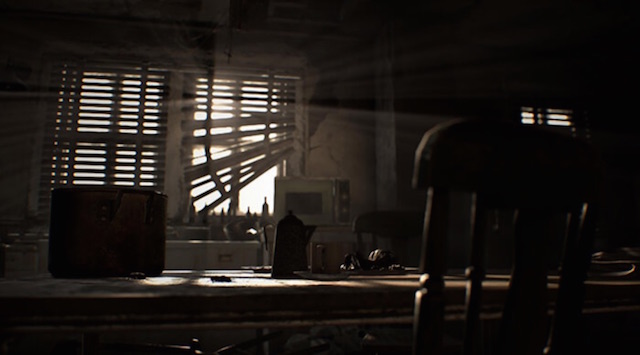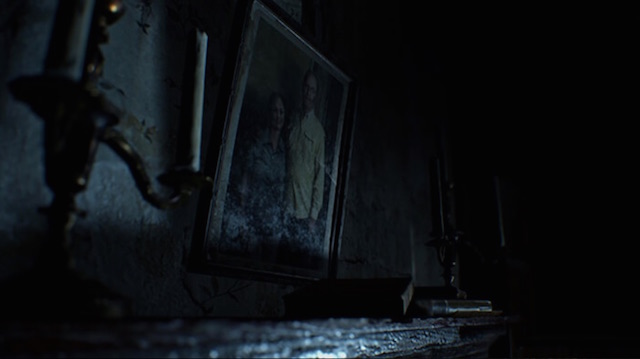Resident Evil 7 opens with your character, Ethan, approaching a seemingly abandoned plantation mansion in Dulvey, Louisiana. The bayou climate is hot and humid. Bugs buzz obnoxiously about your head, and your hand constantly intrudes on your first person viewpoint as you wave them off. You approach the rusted gate, and give the chains a tug. They clang loudly—there’s no music to dilute their sharp sound.
The Resident Evil games, particularly the early ones, are memorable for their unique sound design. Generally speaking, music in video games coincides with action, and the first three games in the Resident Evil franchise inverted expectations; music signified that the coast was clear. It was when things got quiet that you had to stay on your toes. It was a game design convention that defined the survival horror genre. Silence, in the context of these games, was a stimulus rather than the absence of stimulus.
Videos by VICE
Alex Lickerman, a physician and the author of The Undefeated Mind: On the Science of Constructing an Indestructible Self, also considers silence to be a stimulus, and he notes how it can stick out, like a sore thumb, in real-life scenarios.
“Silence can actually be most anxiety-provoking in conversation,” said Lickerman in an interview with Motherboard. “We are constantly reading each other’s verbal or nonverbal cues, and when people are silent, that is one of the most difficult cues to read.”
Silence invites speculation. And over the course of a video game, players can become conditioned to treat silence as something foreboding. As with Pavlov’s dogs, who were conditioned to salivate when they heard a bell ring, players retain emotional memories.
“The stimulus of silence, itself, is not necessarily disturbing,” said Dr. Mary Lamia, a psychologist and psychoanalyst, in an interview with Motherboard. “People who meditate, for example, are not disturbed by silence, and neither are parents who find relief in a quiet house when their children go off to school.”
Negative reactions are learned behavior, gotten through consistent reinforcement,
“People who play such video games are, in a sense, ‘playing’ with their emotions through self-stimulation,” said Lamia. “A sexual fantasy does the same thing; although the stimulus is not real, one’s brain responds as though the object of one’s interest is present.”
But starting with Resident Evil 4, the RE franchise became less about conserving bullets and sneaking about, and more about running and gunning. The games were less “survival horror” experiences and more traditional action/adventure shooters, in which your character fought hordes of infected or undead.
The sound design followed suit in its conventionality: music during action scenes, and silence when threats were neutralized. Critically speaking, this was not well-received. And plus, gamers were too savvy; the tropes, once fresh, had become too predictable.
“I imagine that as people play a horror game, they get used to it no matter what the stimulus is,” remarked Lamia. “Human beings adapt very quickly, and if we didn’t, we would die. To be scary, the stimulus would have to vary to the point where players could not habituate to it.”
Resident Evil 7, which comes out today for Playstation 4, Xbox One, and Steam, is a return to the survival horror that the franchise staked its name on. And with it, a non-traditional, more varied approach to sound is again evident.
Wataru Hachisako, the Audio Director for Resident Evil 7, placed tremendous emphasis on capturing the sounds of daily life—that ambient, background noise that is always occurring—which people get used to on a subconscious level.

Image: Capcom
“Some examples of audio found in daily life could be the subtle sound of electricity in the background, animal or city noises, greenery swaying in the wind, or even the sounds you yourself generate, such as the rustling of clothes or footsteps,” said Hachisako in an email interview with Motherboard. “Sounds such as these aren’t things you might always be conscious of, but they’re all there. By hearing these sounds, it allows someone to feel a sense of routine, comfort, and assurance.”

Image: Capcom
It’s good to establish this sense of daily life, to allow the player to grow accustomed to aspects of the game,” continued Hachisako. “It helps to deepen immersion and gives players a heightened sensitivity to anything that might break from this norm. This is a perfect opportunity to utilize silence, where you wipe away all the assurance and comfort that the user may have.”
Sometimes, instead of cutting all sounds, Hachisako and his team would unnaturally isolate a single one.
“The sound of a ticking clock late at night illustrates that sometimes focusing on a specific sound makes you realize that all other sounds are silent or absent from the picture,” said Hachisako. “By silencing everything else and focusing on a specific sound, we’re able to really heighten the sense of dread of the unknown.”
There’s an irony here—that unease can often spring from mundanity instead of the fantastical. And Resident Evil 7 focuses on and amplifies these smallest of noises—the creak of the floorboards, the intake of breath—to create a horrific, cumulative effect.




